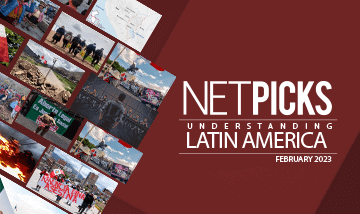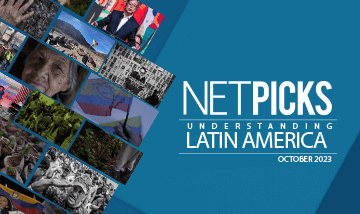Understanding Latin America
Dear readers and colleagues, this month we bring you six articles that reflect the reality of Latin America: one each from Brazil, Mexico, Peru, Argentina, Honduras, and an introduction to the political crisis in Bolivia, a new book of essays by Rosa Luxemburg Stiftung.
- BRAZIL IS EXPERIENCING A FASCIST UPRISING
- THE MILITARIZATION OF MEXICO
- ‘WE’LL FIGHT UNTIL THE END’: A JOURNEY THROUGH THE CENTRE OF PERU’S UPRISING
- HOW TO OVERTURN AN ABORTION BAN
- THE INESCAPABLE PRISON OF BARRIO 18 IN HONDURAS
- DIVERSE VIEWS ON THE POLITICAL CRISIS IN BOLIVIA
.
BRAZIL IS EXPERIENCING A FASCIST UPRISING
On 8 January, more than 4,000 supporters of former Brazilian President Jair Bolsonaro invaded, looted, and vandalized Brazil’s National Congress building and Supreme Court. This event represents a rising fascist threat in the country, according to Brazilian philosopher and psychoanalyst Vladimir Safatle. In a special interview with the Rosa Luxemburg Foundation, Safatle explains what led up to this massive reaction, and how Brazilian democratic society can and should respond. Fascism, he says, has roots in the structural violence of the Brazilian state, which comes from colonialism. The techniques that were later used in European fascism were first developed in the colonies, with things like the development and use of concentration camps in places like South Africa and Cuba. This relationship between fascism and colonialism was never overcome, and in fact stabilized as normal. In Brazil today, we see this in the way that two branches of power, the military and police, were active participants in the January 8 riots. Not only did they refuse to break up encampments, and delayed in stopping rioters, but many police happily posed for selfies with them. Brazil has always been a country prone to fascism, and the rise of Bolsonaro supporters has to be understood through this lens. Any other analyses of Bolsonarismo are deficient and lacking full understanding of this phenomenon. How can Brazil’s democracy respond to these threats?
Vladimir Safatle & Andrea Dip, January 12, 2023
https://www.rosalux.de/en/news/id/49811/brazil-is-experiencing-a-fascist-uprising
.
.
THE MILITARIZATION OF MEXICO
Since last year, Mexico has taken two giant leaps forward to militarize the country in an effort to control rising violence – but at what cost will this come for Mexican society? The latest move occurred in January, when the Senate approved a proposal to extend the Armed Forces’ mandate to participate in public security measures until the year 2028, normalizing army presence on the street. But the first big move came last September, when the Senate approved the president’s proposal for the National Guard to move from civilian command (nominally) in the Ministry of Security and Citizen Protection, to form part of the Ministry of Defense (SEDENA). SEDENA is now responsible for the National Guard’s operation, administration, training and deployment in national territory. This militarization for at least the next six years, or possible forever, has profound implications for Mexican society, democracy, security, gender equality and human rights, says the author. She offers several reasons to oppose these reforms, saying this model generates violence. Studies have shown that homicides have increased in areas where armed forces are deployed, while serious human rights violations by these forces often go unpunished. Could there be another way forward for the country?
Laura Carlsen, January 13, 2023
https://www.counterpunch.org/2023/01/13/the-militarization-of-mexico/
.
‘WE’LL FIGHT UNTIL THE END’: A JOURNEY THROUGH THE CENTRE OF PERU’S UPRISING
Huge areas of Peru have been paralyzed by protests and roadblocks since the downfall of former president Pedro Castillo in December, and at least 59 people have been killed in the uprisings. Many of the protesters are supporters of Castillo, saying his removal from office was part of a plot by the racist and classist political elite. But protests have since grown as people have become more and more outraged at the government’s deadly response. Here, the Guardian takes a closer look at the region most affected by protests, between the Andean cities of Cusco and Juliaca, where 17 people were killed in the worst day of the violence. The article features the voices of those fighting against the Peruvian government, and explores the profound social inequality, poverty and discrimination in these rural areas that lie behind the outrage against what many protesters call the corrupt, self-serving and largely white political establishment in the capital, Lima. The protesters are demanding that the new President Dina Boluarte resign immediately, and fresh elections be held. Boluarte has refused to resign. Since the publication of this article, the Peruvian Congress has agreed to move up elections from 2026 to 2024, but this hasn’t quelled the protests. Boluarte has been pushing for elections to be moved to 2023, but this decision has repeatedly been stalled in the fractured Congress.
Tom Phillips, January 30, 2023
https://www.theguardian.com/world/2023/jan/30/journey-through-the-centre-of-peru-uprising-dina-boluarte
.
HOW TO OVERTURN AN ABORTION BAN
A conversation with three women – a doctor, a former senator, and an activist – reveals new information about how Argentina managed to legalized abortion in 2020, overturning the country’s restrictive and long held abortion ban. The historic vote in Argentina’s congress took place on December 30, after almost 12 hours of uninterrupted debate on the matter, while thousands of women’s rights advocates waited outside in anticipation. The new law, called the Voluntary Interruption of Pregnancy Law, mandates that both private and public health care systems guarantee the right to free, safe and legal abortions. This also became a pioneering law for the rest of Latin America. In a Q&A style article, former senator María de los Ángeles Sacnun, activist and journalist Laura Salomé Canteros, and doctor Julieta Bazán, tell The Dial how feminist movements from various sectors of society worked for years to make this happen. Not only did they present congress well researched data on the dangers and realities of clandestine abortions, but they also made great efforts to put aside differences in party politics to debate the issues with more openness. They went out of their way to speak with journalists and other experts who didn’t agree with them, to try to fully understand the arguments against abortions, have an honest dialogue, and reflect on how to respond to their particular concerns. Read more bellow to find out how this particular kind of patience, research and dedication made Argentina a leader in women’s rights.
Lucía Cholakian Herrera, January 25, 2023
https://www.thedial.world/issue-1/argentina-legalize-abortion-history-activism
.
THE INESCAPABLE PRISON OF BARRIO 18 IN HONDURAS
Barrio 18 is a powerful Central American street gang. Entering can seem like a violent rebirth, as members get a new family, community and a sense of belonging and protection, but of course this comes at a cost. This article tells the story of Desafío, a boy who grew up on the streets of Honduras’ capital Tegucigalpa, and how he became involved in the infamous Barrio 18, the constant state of paranoia that its members are kept under, and the brutal response to anyone who dares to dream of a different life. Desafío has been part of the Barrio 18 street gang for almost 19 years. As he grew up in a poor Barrio 18 controlled neighborhood of the city, his involvement with the gang started with him doing small favors for them, like watching out for patrol cars, when he was 10 years-old. He is currently serving a 20-year prison sentence, and is trying to remove himself from the gang. This is complicated in the outside world, but even more so within prison headquarters, which is under an unofficial power-sharing agreement, with prison authorities on one side and the country’s two largest gangs, Bario 18 and MS13, on the other. Here, Desafío tells Insight Crime his story from the streets of Tegucigalpa to his current prison sentence, which is unfortunately a common story in Honduras.
Juan José Martínez D’Aubuisson, January 17, 2023
https://insightcrime.org/investigations/inescapable-prison-barrio-18-honduras/
.
DIVERSE VIEWS ON THE POLITICAL CRISIS IN BOLIVIA
This new book of essays was born of a need to discuss the political crisis that began in Bolivia in 2019 following the presidential elections that saw Evo Morales elected into office yet again, and was met by mass protests and him being ousted and fleeing to Mexico. The crisis lasted until new elections were held in 2020, but in many ways it is still present today. The book itself aims to enable a more nuanced understanding of the crisis by bringing together various interpretations of it. In this way, it aims to stop replicating the oversimplified explanation of Bolivia’s political crisis, which often is born from polarized political perspectives applied to the country. Some of the essays here focus on understanding the background and causes of the crisis, taking a closer look at former President Evo Morales’ MAS (Movimiento al Socialismo) party and political strategy, as well as expectations from civil society. Other essays look at the progression of the events in 2019 itself, and explore the idea of whether this was a coup d´état or not. Others look at the country during the following Añez government, and how both civil society and political parties responded to this change. At the moment, only the introduction by Louis Claros is available in English online via the link bellow, which itself provides important insight into these complex dynamics. New chapters will be added throughout the month, so be sure to stay tuned.
Various authors, First Edition October 2022
https://rosalux.org.ec/diverse-views-on-the-political-crisis-in-bolivia/





